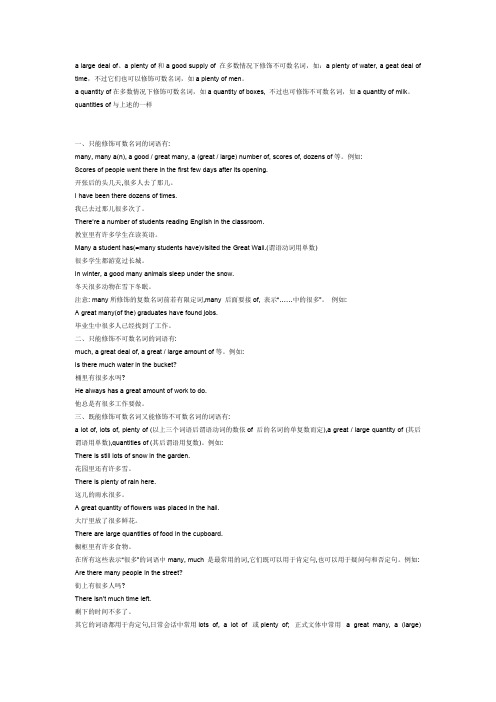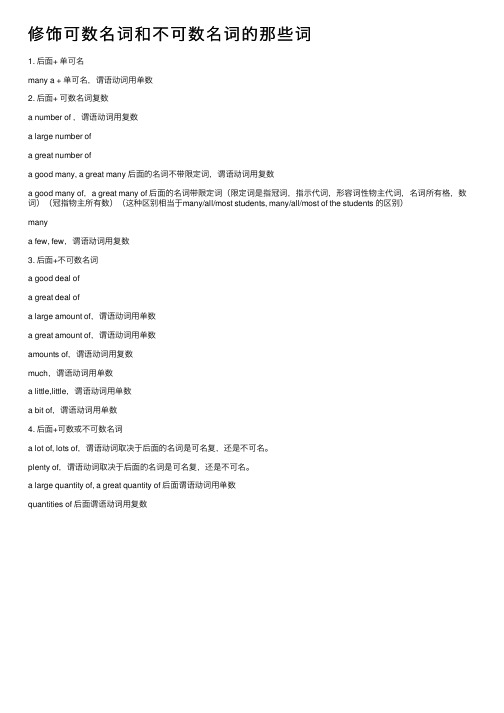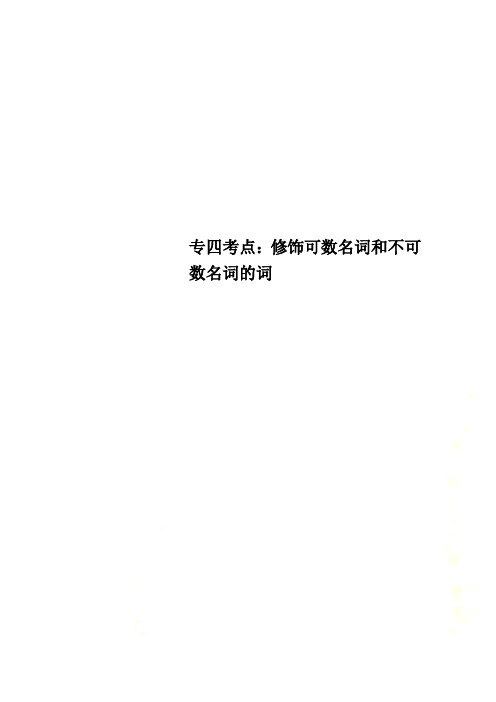可数与不可数名词的常用修饰语
修饰可数名词和不可数名词的单词

a large deal of、a plenty of和a good supply of 在多数情况下修饰不可数名词,如:a plenty of water, a geat deal of time,不过它们也可以修饰可数名词,如a plenty of men。
a quantity of在多数情况下修饰可数名词,如a quantity of boxes, 不过也可修饰不可数名词,如a quantity of milk。
quantities of与上述的一样一、只能修饰可数名词的词语有:many, many a(n), a good / great many, a (great / large) number of, scores of, dozens of等。
例如:Scores of people went there in the first few days after its opening.开张后的头几天,很多人去了那儿。
I have been there dozens of times.我已去过那儿很多次了。
There’re a number of students reading English in the classroom.教室里有许多学生在读英语。
Many a student has(=many students have)visited the Great Wall.(谓语动词用单数)很多学生都游览过长城。
In winter, a good many animals sleep under the snow.冬天很多动物在雪下冬眠。
注意: many所修饰的复数名词前若有限定词,many 后面要接of, 表示“……中的很多”。
例如:A great many(of the) graduates have found jobs.毕业生中很多人已经找到了工作。
二、只能修饰不可数名词的词语有:much, a great deal of, a great / large amount of等。
可数名词和不可数名词的常考点

更多免费学习资料,欢迎关注微信公众号:考试笔记可数名词和不可数名词的常考点一、可数名词1. 可数名词有哪些语法特点如果一个名词是可数的,那么它就可以用不定冠词来修饰,或用数词来修饰,并且可以有复数形式。
如:A tree has fallen across the road. 一株树倒下横在路上。
Our house has five rooms. 我们的房子有5个房间。
2. 可数名词有哪些常用修饰语通常用于修饰可数名词的修饰语有some, any, many, few, a few, a lot of, lots of, plenty of, a great many, a great number of等修饰。
如:I have lived here for many years. 我在这里住了好多年了。
Remember to buy some stamps, won’t you?记着买些邮票好吗?Plenty of shops open on Sunday mornings. 周日上午很多商店营业。
A great many people were at the meeting. 很多人参加了会议。
A great number of our students are American. 我们的学生中有许多是美国人。
注意:其中的some, any, a lot of, lots of, plenty of既可用于修饰可数名词,也可用于修饰不可数名词;而其中的many, few, a few, a great many, a great number of则只用于修饰可数名词,不用于修饰不可数名词。
二、不可数名词1.如果一个名词是不可数的,那么它就不可以用不定冠词来修饰,也不可以用数词来修饰,同时也没有复数形式。
如:夏天在海里游泳是一大乐趣。
误:Swimming in the sea is a great fun in summer.正:Swimming in the sea is great fun in summer.这本书包含许多有用的信息。
修饰可数名词和不可数名词的那些词

修饰可数名词和不可数名词的那些词
1. 后⾯+ 单可名
many a + 单可名,谓语动词⽤单数
2. 后⾯+ 可数名词复数
a number of ,谓语动词⽤复数
a large number of
a great number of
a good many, a great many 后⾯的名词不带限定词,谓语动词⽤复数
a good many of,a great many of 后⾯的名词带限定词(限定词是指冠词,指⽰代词,形容词性物主代词,名词所有格,数词)(冠指物主所有数)(这种区别相当于many/all/most students, many/all/most of the students 的区别)
many
a few, few,谓语动词⽤复数
3. 后⾯+不可数名词
a good deal of
a great deal of
a large amount of,谓语动词⽤单数
a great amount of,谓语动词⽤单数
amounts of,谓语动词⽤复数
much,谓语动词⽤单数
a little,little,谓语动词⽤单数
a bit of,谓语动词⽤单数
4. 后⾯+可数或不可数名词
a lot of, lots of,谓语动词取决于后⾯的名词是可名复,还是不可名。
plenty of,谓语动词取决于后⾯的名词是可名复,还是不可名。
a large quantity of, a great quantity of 后⾯谓语动词⽤单数
quantities of 后⾯谓语动词⽤复数。
修饰可数名词和不可数名词的单词

a large deal of、a plenty of和a good supply of 在多数情况下修饰不可数名词,如:a plenty of water, a geat deal of time,不过它们也可以修饰可数名词,如a plenty of men。
a quantity of在多数情况下修饰可数名词,如a quantity of boxes, 不过也可修饰不可数名词,如a quantity of milk。
quantities of与上述的一样一、只能修饰可数名词的词语有:many, many a(n), a good / great many, a (great / large) number of, scores of, dozens of等。
例如: Scores of people went there in the first few days after its opening.开张后的头几天,很多人去了那儿。
I have been there dozens of times.我已去过那儿很多次了。
There’re a number of stude nts reading English in the classroom.教室里有许多学生在读英语。
Many a student has(=many students have)visited the Great Wall.(谓语动词用单数)很多学生都游览过长城。
In winter, a good many animals sleep under the snow.冬天很多动物在雪下冬眠。
注意: many所修饰的复数名词前若有限定词,many 后面要接of, 表示“……中的很多”。
例如:A great many(of the) graduates have found jobs.毕业生中很多人已经找到了工作。
二、只能修饰不可数名词的词语有:much, a great deal of, a great / large amount of等。
修饰可数名词和不可数名词的单词

a large deal of、a plenty of和a good supply of 在多数情况下修饰不可数名词,如:a plenty of water, a geat deal of time,不过它们也可以修饰可数名词,如a plenty of men。
a quantity of在多数情况下修饰可数名词,如a quantity of boxes, 不过也可修饰不可数名词,如a quantity of milk。
quantities of与上述的一样一、只能修饰可数名词的词语有:many, many a(n), a good / great many,a (great / large) number of,scores of,dozens of等.例如:Scores of people went there in the first few days after its opening.开张后的头几天,很多人去了那儿。
I have been there dozens of times.我已去过那儿很多次了。
There’re a number of stude nts reading English in the classroom。
教室里有许多学生在读英语。
Many a student has(=many students have)visited the Great Wall.(谓语动词用单数)很多学生都游览过长城.In winter,a good many animals sleep under the snow。
冬天很多动物在雪下冬眠。
注意: many所修饰的复数名词前若有限定词,many 后面要接of, 表示“……中的很多”. 例如:A great many(of the)graduates have found jobs。
毕业生中很多人已经找到了工作。
二、只能修饰不可数名词的词语有:much, a great deal of, a great / large amount of等.例如:Is there much water in the bucket?桶里有很多水吗?He always has a great amount of work to do。
修饰可数名词和不可数名词的词

修饰可数名词和不可数名词的词TPMK standardization office【 TPMK5AB- TPMK08- TPMK2C- TPMK18】修饰可数名词和不可数名词的词首先要搞清楚,是修饰可数名词或不可数名词,而不是单数或复数名词。
可数名词都有复数形式,而不可数名词没有复数形式。
a large deal of, plenty of和a good supply of 在多数情况下修饰不可数名词,如: plenty of water, a great deal of time,不过它们也可以修饰可数名词,如 plenty of men。
a quantity of在多数情况下修饰可数名词,如a quantity of boxes, 不过也可修饰不可数名词,如a quantity of milk。
quantities of与上述的一样一、只能修饰可数名词的词语有: many, many a(n), a good / great many, a (great / large) number of, scores of, dozens of 等。
例如:Scores of people went there in the first few days after its opening. 开张后的头几天,很多人去了那儿。
I have been there dozens of times. 我已去过那儿很多次了。
There’re a number of students re ading English in the classroom. 教室里有许多学生在读英语。
Many a student has(=many students have)visited the Great Wall.(谓语动词用单数) 很多学生都游览过长城。
In winter, a good many animals sleep under the snow. 冬天很多动物在雪下冬眠。
专四考点:修饰可数名词和不可数名词的词

专四考点:修饰可数名词和不可数名词的词修饰可数名词和不可数名词的词首先要搞清楚,是修饰可数名词或不可数名词,而不是单数或复数名词。
可数名词都有复数形式,而不可数名词没有复数形式。
a large deal of, plenty of和a good supply of 在多数情况下修饰不可数名词,如:plenty of water, a great deal of time,不过它们也可以修饰可数名词,如plenty of men。
a quantity of在多数情况下修饰可数名词,如a quantity of boxes, 不过也可修饰不可数名词,如a quantity of milk。
quantities of与上述的一样一、只能修饰可数名词的词语有: these, those, few, a few, many, many a(n), a good / great many, a (great / large) number of, scores of, dozens of等。
例如: Scores of people went there in the first few days after its opening. 开张后的头几天,很多人去了那儿。
I have been there dozens of times. 我已去过那儿很多次了。
There’re a number of students reading English in the classroom. 教室里有许多学生在读英语。
Many a student has(=many students have)visited the Great Wall.(谓语动词用单数) 很多学生都游览过长城。
In winter, a good many animals sleep under the snow. 冬天很多动物在雪下冬眠。
注意: 注:a good [great] many 后直接跟名词,不用介词of。
专四考点修饰可数名词和不可数名词的词

修饰可数名词和不可数名词的词首先要搞清楚,是修饰可数名词或不可数名词,而不是单数或复数名词。
可数名词都有复数形式,而不可数名词没有复数形式。
a large deal of, plenty of 和a good supply of 在多数情况下修饰不可数名词,如:pienty of water, a great deal of time,不过它们也可以修饰可数名词,如plenty of men。
a qua ntity of在多数情况下修饰可数名词,如a qua ntity of boxes,不过也可修饰不可数名词,如 a quantity of milk。
qua ntities of与上述的一样一、只能修饰可数名词的词语有: these, those, few, a few, many, many a(n), a good / great many, a (great / large) nu mber of, scores of, doze ns 等。
例女口: Scores of people went there in the first few days after its ope ning.开张后的头几天,很多人去了那儿。
I have bee n there doze ns of times 我已去过那儿很多次了。
There ' re a number of students reading English in the classroom.室里有许多学生在读英语。
Many a stude nt has(二ma ny stude nts have)visited the Great Wall.谓语动词用单数) 很多学生都游览过长城。
In winter, a good many animals sleep under the snow. 冬天很多动物在雪下冬眠。
注意: 注: a good [great] many 后直接跟名词,不用介词of 。
- 1、下载文档前请自行甄别文档内容的完整性,平台不提供额外的编辑、内容补充、找答案等附加服务。
- 2、"仅部分预览"的文档,不可在线预览部分如存在完整性等问题,可反馈申请退款(可完整预览的文档不适用该条件!)。
- 3、如文档侵犯您的权益,请联系客服反馈,我们会尽快为您处理(人工客服工作时间:9:00-18:30)。
可数与不可数名词的常用修饰语一、修饰可数名词的常用修饰语有these, those, few, a few, many, a good[great] many, a great [good] nu mber of 等:Few people would agree with this.很少人会同意这种看法。
He has a great many friends here他在这儿有很多朋友。
注:a good [great] many后直接跟名词,不用介词of。
但是,若其后所接名词有the,these,my等限定词修饰,则要用介词of:agreatmanyofmyfriends 我的朋友当中的许多人二、修饰不可数名词的常用修饰语有this,that,little,alittle,abitof,much, a great deal of, a large amount of 等:I have little time to do it. 我没什么时间来做此事。
He didn ' t give me much mone他没给我很多钱。
A great deal of money is spent on research研究工作上花了许多钱。
注:在现代英语中,agreatamountof 后有时也接可数名词,但有许多语法学家反对,学生最好避免使用。
三、有些修饰语既可修饰可数名词也可修饰不可数名词,如all,some,e no ugh,a lot of, lots of, plenty of, a (large) qua ntity of 等:You needn ' t hurry. There ' s plenty你不必着急。
时间多着哩。
There are plenty of men out of work.失业的人很多。
We need a qua ntity of baskets 我们需要一批篮子。
He p ut a small qua ntity of sugar in the milk.他在牛奶中放了少量的糖。
四、有些名词形式上是复数,但却被用作不可数名词,使用much, little 等修饰语:He hasn ' t got much brain他没什么头脑。
He took much p ai ns to do the work.他费了不少心做这工作。
I said I wouldn ' t want much WOge过我不要很多工资。
It's high time you were taught a little ma nn ers.该是你学一点礼貌的时候了。
有关名词可数性的三个XX点■根据汉语习惯将英语的物质名词误认为是可数名词。
如汉语中的面包”,一般认为是可数的,可以说一个面包”、两个面包”等,但英语中的bread 却通常是不可数的,不能相应地用 a bread, two breads表示以上意思。
不过有趣的是,loaf表示面包”却是可数的,可说a loaf, two loaves。
■想当然地判断名词的可数性。
如有的学生认为news(消息)和paper(纸)都不可数,于是便想当然地认为n ews pap er(报纸)就一定不可数,但事实上,news paper却是可数名词;又如有的同学认为tear(眼泪)即泪水”并将其与water(水)相联系,认为tear是不可数的,但事实上,tear却是可数的。
■受名词一词多义的影响。
有的名词不只一个意思,且用于不同意思时,其可数性也有所不同。
如aim表示目的”时是可数名词,表示瞄准”时是不可数名词;又如experienee 表示经验”时不可数,表示经历”时则可数;再如fortune,当它表示运气”时,不可数(=luck),当它表示命运”时,可数,当它表示财产”时,不可数,但可与不定冠词连用。
抽象名词的可数性抽象名词是表示事物性质、行为、状态、感情等抽象概念的,因此它通常是不可数的。
但是,有时抽象名词也可转化为具体名词(可数),表示具有某种性质的人或事物。
如:help帮助(不可数)-help帮手(可数)shame遗憾(不可数)f pit遗憾的事(可数)pleasure快乐(不可数)f pleasures事(可数)success成功(不可数)f succes成功的人或事(可数)surprise惊奇(不可数)f surpris令人惊奇的事(可数)success成功(不可数)f a succes成功的人或事(可数)(可数)pleasure愉快(不可数)f apleasu令人愉快的人或事(可数)(可数)disaPPointment失望(不可数)f disappointment令人失望的人或事(可数)物质名词可数吗由于物质名词在通常情况下不能分为个体,所以它通常是不可数的。
但是,在某些特殊情况下(如表示种类等),有些物质名词也可以连用不定冠词或用复数形式:wine酒(不可数)7 a wine^种酒(可数)beer啤酒(不可数)f two beers两杯啤酒(可数)glass玻璃(不可数)f some glasse s些玻璃杯(可数)请看具体用例:The P otato is a vegetable, n ot a fruit. 土豆是一种蔬菜,不是水果。
Marble is a precious stone大理石是一种珍贵的石料。
My doctor told me to avoid fatty foods such as bac on or hamburgers 我的医生叫我避免吃油腻的食物,如咸肉或汉堡包。
专有名词可数吗在通常情况下,专有名词具有“独一无二”性,因此它通常没有复数形式,即不可数。
但是,专有名词的独一无二性有时是相对的,随着范围的扩大,这种独一无二性便会受到破坏。
如在一个星期(week )内,只有一个星期六(Saturday)一个星期日(Sunday 等,但是在一个月中甚至一年中,便有多个星期 六,多个星期日了。
所以我们有时可以说:We have spent ma ny happy Sun days there 我们在那儿度过了许多个愉快的星 期日。
又如,在一个小范围内,可能只有一个 Henry ,但在一个较大的范围内则可 能有多个Henry,因此我们有时会见到这样的句子:There are five Henrys in our school 我们学校有五个亨利。
另外,若专有名词转化成为普通名词,也可以是可数的:Thousa nds of Lei Fengs have emerged in Chin 中国涌现出了千千万万个雷 锋。
字母和文字如何变复数All the -' s should be changed tc 所有的负号应改为正号。
若不至于发生混淆,也可只加词尾 -s :He was born in the 1930( 他岀生在20世纪30年代。
Your 3( ' )s look like 8你写的'3看起来像8。
"Chi na '与Ch in ese 有何区别■ China '为名词所有格,强调所属关系。
如:China ' s population is large.国人口众多。
Hainan is China ' s second largest 海南是中 国第二大岛。
般说来,字母和文字在变复数时,通常是在词尾加 。
如:There are two i ' s in the word p ' s and q 要谨言慎行。
“这个司里有Sk 个字母i 。
Mi nd yours sescoriVelio n黄河是中国第二大河。
The Yellow River is ChinaChina ' s countryside looks itsbest in May and Jun中国的农村在五六月时景色最美。
■ Chinese 为形容词,表示属性,视所修饰的名词不同,意思稍有不同:Maotai is a Chi nese wine茅台是一种中国酒。
Are you into Chinese food?尔对中国菜有兴趣吗?This book is about Chi nese traditkmal medici ne 这本书是讲中医的。
This was a record set by a Chin ese gi这是一个中国姑娘创造的记录。
My stron gest memory is whe n I atte nded a Chin ese weddi ng 我印象最深的是我参加的一次中国婚礼的情景。
Gon earethedayswhe ntheycouldtowhattheylikedtotheChi nese people.他们能够对中国人民为所欲为的日子一去不复返了。
Thinking that traditional Chinese medicine might help, they sent for anoldChi nese doctor他们请了一位老中医,因为他们考虑到也许中医会有效。
备考名词考点最可能忽略的6 种信息、忽略句意信息有的名词考题从表面上看是考查名词的辨析,但实际上是考查不同名词对特定句意的吻合性,即在给定的四个名词选项中,只有一个名词填入句中能使句意最通顺,最连贯,最合情理。
如:1. The top leaders of the two countries are holding talks in a friendly___. (2008 湖北卷)A. atmosphereB. stateC. situationD. phenomenon答案为A。
比较:atmosphere意为气氛”;state意为状态”;situation意为状况,处境”;phenomenon意为现象”。
分别将四个词填入空格,显然只有A最合适,全句意为:两国高层领导正在友好的气氛中举行会谈。
A. lookB. signC. sightD. appearance答案为C。
比较四个选项的意思:在这个城市的许多地方到处可见人们把衣服晒在街道上。
二、忽略暗示信息有的名词考题,如果单从空格来看,可能无法选择一个合适的答案,但如果综合观察整个句子,有可能在句中找到一个对做题具有重要意义的关键信息,这个信息会给考生一个重要暗示,提醒考生因为这个信息的存在,答案只能是其中的某一个,而不能是其他几个。
如:1. Most air pollution is caused by the burning of ___ like coal, gasand oil. (2008 天津卷)A. fuelsB. articlesC. goodsD. products答案为A。
